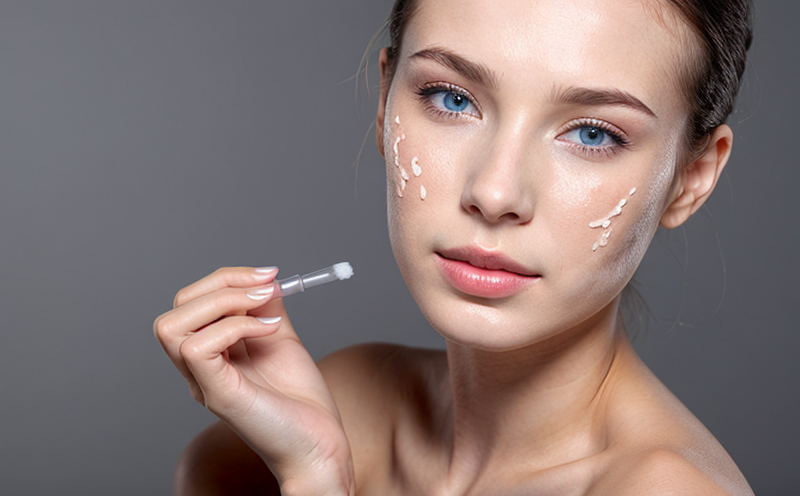Sensitization Testing of Mascara Products
The sensitization testing of mascara products is a critical component in ensuring that cosmetic formulations are safe and do not cause adverse reactions when used by consumers. This service involves the evaluation of whether mascara products have the potential to induce an allergic reaction, commonly referred to as contact dermatitis. Contact dermatitis can range from mild irritation to severe allergic responses, which are among the most common complaints related to cosmetic use.
The process begins with the selection of appropriate test subjects, typically guinea pigs or rabbits, depending on regulatory requirements and ethical considerations. The selected animals undergo a series of tests designed to assess the potential for allergenicity. This involves exposing the subjects to mascara formulations under controlled conditions and monitoring their physiological responses over time.
The testing protocol is based on international standards such as OECD Guideline 406 and ISO/IEC 17025, which ensure that the testing process adheres to rigorous scientific methods. The tests are designed to identify any substances within the mascara formulation that may cause an immune response leading to sensitization.
Once the test subjects have been exposed to the mascara formulations, they undergo detailed observations and assessments for signs of irritation or allergic reactions. This can include changes in skin appearance, inflammation, redness, or other indicators of a potential allergic response. The data collected during these tests is then analyzed to determine if the formulation meets regulatory standards and consumer safety requirements.
The results of sensitization testing are crucial for cosmetic manufacturers as they provide valuable insights into the allergenic potential of their products. These findings help in refining product formulations, ensuring compliance with international regulations, and safeguarding public health. By incorporating this service into their quality assurance processes, companies can enhance consumer trust and reduce the risk of legal issues or negative publicity associated with product safety concerns.
It is important to note that sensitization testing goes beyond mere compliance checks; it plays a vital role in advancing the science of cosmetic formulation and enhancing product safety. Through continuous improvement based on test results, manufacturers can develop safer and more effective mascara products that meet both regulatory standards and consumer expectations.
Scope and Methodology
| Test Subject | Exposure Period | Environmental Controls |
|---|---|---|
| Rabbits | 14 days | Standard laboratory conditions |
| Guinea Pigs | 28 days | Adapted to specific allergen exposure protocols |
| Skin Reaction | Observed Symptoms | Severity Classification |
|---|---|---|
| Inflammation | Reddening, swelling | Moderate to Severe |
| Irritation | Blisters, cracks | Mild to Moderate |
Benefits
The sensitization testing of mascara products offers several significant benefits for cosmetic manufacturers and the broader consumer community. Firstly, it ensures that products are free from substances that can cause allergic reactions or severe irritations, thereby enhancing product safety. This is particularly important given the wide range of skin types and sensitivities among consumers.
Secondly, successful completion of these tests demonstrates compliance with international regulatory standards, which helps build consumer trust and confidence in the brand. Many consumers look for certifications and clear labeling that indicate a product's safety profile, making this service an essential marketing tool.
Thirdly, sensitization testing provides manufacturers with valuable data to refine their formulations continuously. This iterative process allows companies to identify potential allergens early in the development cycle, leading to more robust and effective products over time.
Finally, by incorporating these tests into their quality assurance processes, cosmetic brands can avoid legal issues associated with product liability claims or negative publicity from safety concerns. The proactive approach not only protects the company's reputation but also contributes positively to public health and well-being.
International Acceptance and Recognition
The sensitization testing of mascara products is widely recognized and accepted by international regulatory bodies, including those in Europe (European Commission), North America (FDA), and Asia-Pacific regions. These organizations have established guidelines and standards that govern the conduct of such tests to ensure consistency and reliability across different jurisdictions.
For instance, the European Union has strict regulations regarding cosmetic safety, requiring manufacturers to demonstrate compliance through rigorous testing procedures like sensitization testing. Similarly, the FDA in the United States emphasizes the importance of pre-market safety assessments for all new cosmetic products and ingredients. In Asia-Pacific countries, there is increasing emphasis on aligning with global standards to ensure market access while maintaining high product quality.
The acceptance of these tests by regulatory bodies underscores their significance in ensuring public health and safety. By adhering to these internationally recognized protocols, cosmetic manufacturers can navigate the complexities of global markets more effectively, reducing compliance risks and enhancing brand reputation.





